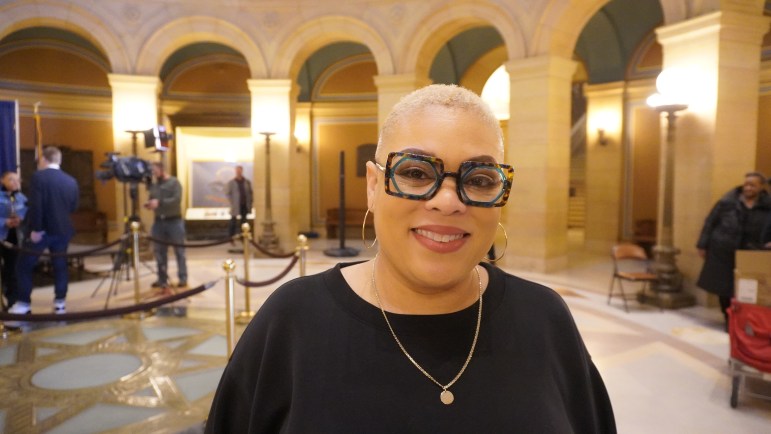Doing more together to reclaim Black economic independence
On February 3, and for the third year in a row, the Minnesota State Capitol was the site of a powerful convening of Black entrepreneurs, activists, and community leaders, all determined to carve out a sustainable future for (their) Black businesses. The event was organized by children’s author Sheletta Brundidge with a clear purpose: to get Black business owners in front of their legislators, ensuring their voices are heard by the elected officials who are responsible for shaping policies that affect their economic future.

Collective support makes cooperative economics possible
The concept of cooperative economics has long been a pillar of the Black community, shaping historical moments of economic empowerment, such as Black Wall Street. While these thriving hubs once flourished, the challenge today is finding a path back to that level of collective success. Today, the pressing question remains: How do we reclaim that legacy?
Business owners and community leaders emphasize that reclaiming this legacy requires intentional support and strategic action. Black businesses must be deliberate in how they support and market to one another, ensuring that community values remain at the forefront.

Economic empowerment is not just about individual success but also about collective upliftment, a principle echoed by Cara Deanes, executive director of Roho Collective. She emphasizes the importance of turning communal ideals into tangible action.
“We often use the quote ‘It takes a village,’ but [it’s about] putting that to action in a very real way,” Deanes said. “Every step that we take first starts at home — looking at businesses that are right around the corner, entrepreneurs that live right next to us. How do we support one another and build money and infrastructure into our own community?”

This sentiment is further reinforced by The Dream Shop owner Markella Smith, who underscores the responsibility of those with access and resources to uplift others, particularly in a time when economic boycotts and shifting consumer habits demand stronger community networks.
“I think being supportive of where people are at, not making them feel guilty, but asking yourself, ‘How do you, as a person with access and who has the means, help someone else?’ The people who have the means have to possibly go out of their way to help their neighbors who don’t have access,” Smith said.
Rebuilding economic strength within the Black community requires a mixture of empathy, mutual respect, and a commitment to collaboration.

The power of the Black dollar
Another major theme of the conversations in the Black community has been the concept of strategic boycotting in 2025 following President Trump’s executive orders to retract DEI policy, which aligns with the broader conversation around cooperative economics. Rather than simply protesting companies that have abandoned DEI commitments, the focus is on creating lasting economic shifts by building a culture of intentional Black consumerism.
Historical precedent underscores the power of collective economic action. The Montgomery Bus Boycott, led in part by Dr. Martin Luther King Jr., lasted 381 days from December 5, 1955, to December 20, 1956. Black residents of Montgomery, Alabama, refused to ride segregated city buses, demonstrating the strength of unified financial resistance.
Their dedication resulted in a landmark Supreme Court ruling that deemed segregation on public buses unconstitutional. The boycott not only reshaped civil rights policy, but also highlighted how Black economic power could drive systemic change.

“I think that we as the people need to move quietly, right?” Smith said. “We’re so loud about what we’re doing, but our money talks. So yeah, it’s cool — let’s boycott, let’s cancel this and let’s cancel that, right?
“But how much more powerful is it if we do it quietly? How much more powerful is it if we actually are intentional again with supporting our businesses? Like, I have a whole gift shop — you shouldn’t be going to Target in the first place, right? So how are we again being intentional about really spending our dollars amongst our own businesses and our own people?”
Sheletta Brundidge, event host and founder of ShelettaMakesMeLaugh.com, also emphasized that economic independence is critical. “We have enough money as Black buyers to support each other, and we can all get rich.
“We’ve gotten complacent. We gotta go back to the way we used to do things. We gotta go back to the old school, ’cause we can no longer afford to sit back and wait for things to change. We have to pivot, and to me, that pivot looks like doing more together,” Brundidge said.

Real estate agent Michael Roberts echoed this sentiment, highlighting that financial empowerment requires a shift in how Black consumers approach wealth-building. “Someone once asked me, ‘When are Black folks going to be on top again?’ to which I responded, ‘As soon as we start investing as much as we’re consuming.’ We are only as strong as our weakest link.”
He also stressed that homeownership is a crucial path toward economic stability, as housing expenses [on average] make up 30-40% of the average American’s income. Rather than solely renting, he encourages individuals to make their housing costs work for them by building equity.
The call to action is clear: Rather than waiting for external policies to dictate economic outcomes, Black consumers must take control of their financial choices and direct them toward businesses that actively invest in their communities. The success of past boycotts serves as proof that sustained, strategic economic action can bring about real change.
Kiara Williams welcomes reader responses at kwilliams@spokesman-recorder.com.




